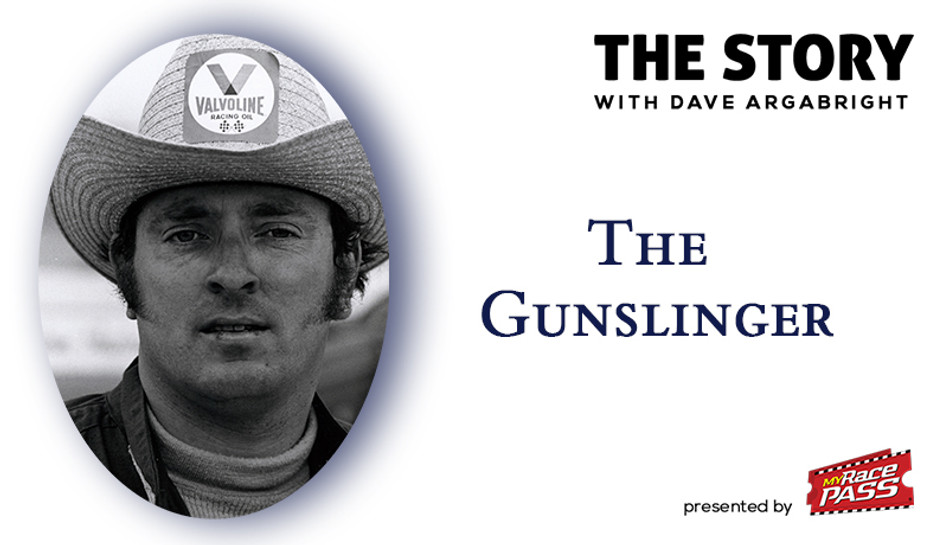He was one bad dude among a bunch of bad dudes, Hell on Wheels and chock full of daring and excitement. Nobody on the track was more thrilling, more exciting, more full of himself. He was the embodiment of everything you’d want a sprint car driver to be: fearless, bold, a little bit wild, and a whole lotta brave.
Butch Wilkerson died a few weeks ago at age 80, slipping away after a series of health struggles. It seems ironic, such a quiet ending for a guy who had a habit of making such a lot of noise.
If you grew up a generation ago watching sprint cars in the Midwest, you probably know all about Butch because his performances on the race track are seared into your mind. If you’re from another place or time, you might figure this was just another old racer who left us and isn’t that a shame.

There are lots of racers, young and old. None were quite like Butch, because he was a different cat. He had lots of friends and surely a few who found the jut of his cocky, brash jaw a little hard to take. No matter. Butch was Butch whether you liked it or not.
It isn’t hyperbole to say that in the old west Butch would have been a gunslinger. That attitude—I’m faster than you and not afraid to prove it—was at his core. Live fast, die young, fear nothing or nobody; that was the essence of Butch Wilkerson.
Let me tell you about Indiana sprint car racing in the 1970s. For a young boy sitting in the grandstands, it was dynamic almost beyond description. Lawrenceburg, Kokomo, Haubstadt, Paragon, Bloomington, Anderson, and Warsaw were the busy tracks. Local heroes were Dick Gaines, Bob Kinser, Sheldon Kinser, Allen Barr, Ron Fisher, Ed Angle, Bobby Black, Calvin Gilstrap—and many more. Cliff Cockrum, Bubby Jones, and Chuck Amati would drift into town from Illinois, while Rick Ferkel and Doc Dawson would occasionally come in from Ohio.
In the middle of all this madness was Butch Wilkerson. In spite of the stout competition, he won more than his share of races. He drove for just about every car owner at one time or another—every race car was referred to as a “shitbox” whether it was or not—but when he teamed with Jim McQueen for a season or two in the mid-1970s they were something to behold. With teenager Owen Snyder on the wrenches, they are said to have won 29 races in 1975. And they didn’t just win; they raced with pure excitement.
In the heyday of the 1970s Lawrenceburg was a genuine bullring, a steeply-banked quarter with no wall on the outside. Watching Butch put the McQueen car up on the peak of the banking and run a wide-open lap was a religious experience. You were never the same after you saw it.
If all of this sounds like superlatives, I guess it is. All I know is that of the countless people I’ve seen race, few could match the pure gusto of Butch Wilkerson in a sprint car.

Among a lot of brave people, this man looked utterly fearless. He didn’t fear crashing and he didn’t fear the wrath of his competitors after the race. Butch raced with such intensity that the moment at hand mattered more than anything else. This is it, life or death. Win or bust.
He was driven by an insatiable desire to win, to succeed, to be something special. Indianapolis, and the 500, was the ultimate goal. Because if you made Indy, you made it all. By the late ‘70s Butch was growing restless, resorting to everything short of outright begging to find a pathway to Indy. Despite his distaste for rules and boundaries, he accepted that racing with USAC might make it happen.
That’s why he was in a Sherman Armstrong sprint car at Winchester on Oct. 21, 1979. Butch touched wheels with another car and half-spun, hitting the outside wall with tremendous force. He suffered a severe head injury and was comatose for 28 days. He never raced competitively again. He was 35 years old.
Butch’s life was divided into two periods; before Winchester and after Winchester.
The greatest struggle of his life was gracefully accepting the circumstances that ended his career while at the apex. Butch never made Indy, and he was most certainly not satisfied with what he was able to accomplish in a race car. Unfulfilled ambitions can be awfully hard to shake, and Butch was no exception.
But he still loved racing and he loved being around racing people. If you’d get Butch and his cronies together the stories were fast and fun. After his accident Butch became a Christian, and if a prayer was going to be given at a racing function he was first in line to give it.
The past year was tough on the ol’ bird, but he isn’t suffering anymore. As a friend, I will miss him very much, his stories and his chutzpa and his infectious laughter.
Butch loved to see his name in the racing papers. He loved the spotlight. Like most great racers, too much attention was not a thing.
I don’t know if they have can access the web in the great beyond, but I hope so. My wish is that Butch could read this and immediately jump out of his chair and make sure everybody else read it, too.
So here you go, Butch. One more story, just for you. Adios, old friend. Rest easy.
<30>

